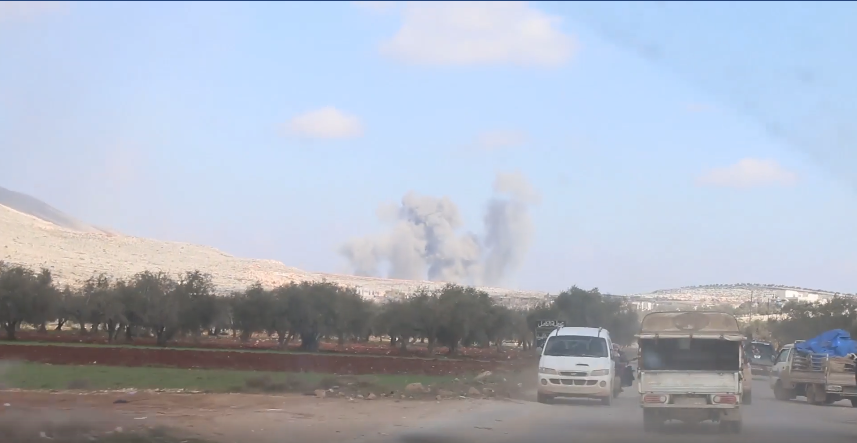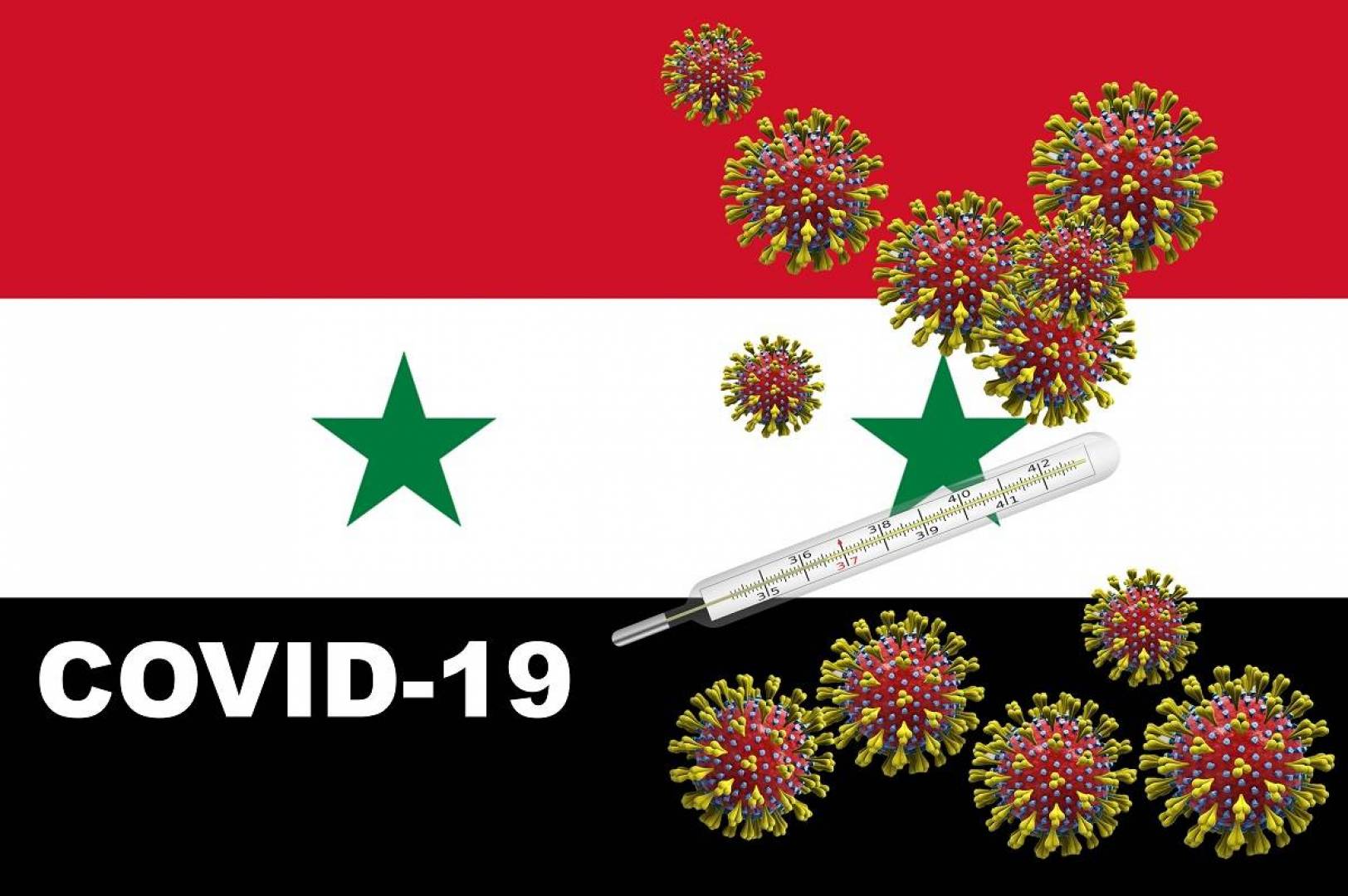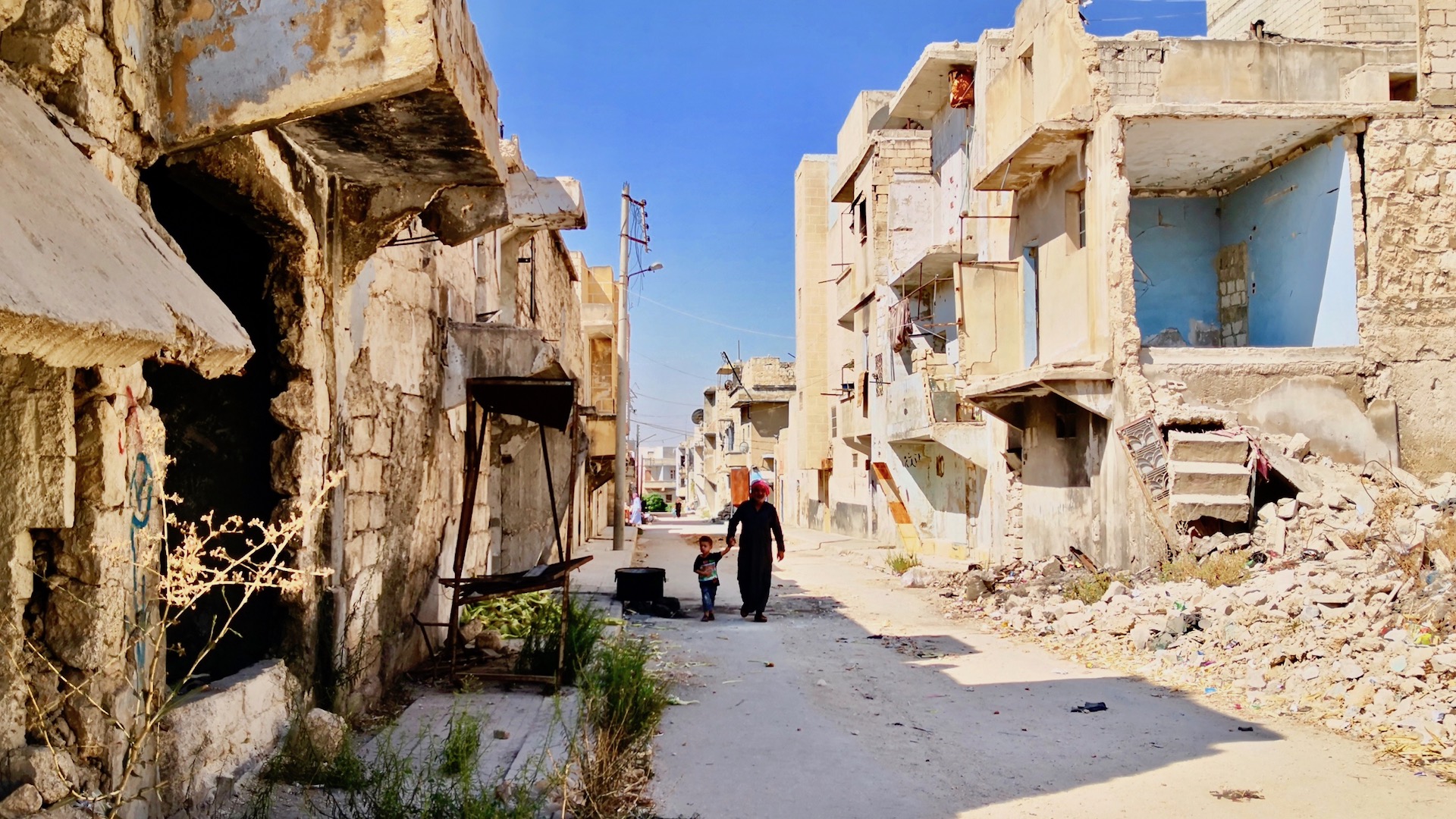There could hardly have been a worse time for aid deliveries into northwestern Syria to come under threat.
More than a year of government airstrikes and artillery fire have sent roughly one million people into displacement, and bombed dozens of hospitals and medical clinics out of service. Residents of rural Idlib province and parts of neighboring Aleppo’s countryside—the last major pocket of rebel-held territory in Syria—now live crammed into makeshift displacement camps where shelter is scarce and proper sanitation and hygiene services are a luxury.
Then, last week, local authorities announced the northwest's first recorded case of COVID-19, a doctor who had reportedly traveled between Turkey and Syria. Two more doctors and a nurse later tested positive as well. It is not yet clear how far any other infections may have now spread in the northwest, though health officials have for months sounded the alarm that densely packed and poorly served camps in the area could be ripe for transmission of the deadly virus.
To add to Idlib's woes, last week brought fears that vital UN aid into northwestern Syria, including medical supplies necessary for fighting COVID-19, could suddenly halt.
Since 2014, the UN, which trucks in and coordinates much of the aid that now reaches Syria’s north, has been authorized to deliver supplies via a series of international border crossings. Those crossings once included two from Turkey in the northwest—Bab al-Hawa and nearby Bab al-Salameh—as well as one into the south from Jordan and another into the northeast from Iraq. The Jordan and Iraq crossings were de-authorized in a UN Security Council vote in January, leaving northeastern Syria cut off from UN cross-border aid and largely reliant on government-approved deliveries from Damascus.
And on Saturday, after a last-minute vote, the Bab al-Salameh crossing was de-authorized as well, following Russian and Chinese pressure. Only one crossing remains: Bab al-Hawa, which enters Idlib province, and is authorized for another year, according to the German-Belgian proposal that eventually passed.
Millions of Syrians now rely on just the one border crossing for life-saving UN aid. The decision pits northwestern Syria’s fate further into the unknown, as the area has been the target of a more than year-long campaign by government and allied Russian forces to seize remaining rebel territory there. More than a thousand civilians have been killed, including children.
There are few viable alternatives to the international crossings, and rerouting any potential aid to Idlib via Damascus is simply “unrealistic,” says Jomana Qaddour, a non-resident senior fellow at the Atlantic Council and co-founder of Syria Relief and Development (SRD), a humanitarian organization operating on the ground in northern Syria.
“It would be unrealistic to expect that the same regime that is targeting [Syrians in the north] with aerial attacks would now want to feed them or provide them with humanitarian aid,” according to Qaddour.
SyriaUntold spoke with Qaddour late last week, as the UN Security Council convened to vote on continued access to the crossings.
We already saw this issue six months ago with the previous vote, when the mandate for the Yaroubiyeh crossing from Iraq into northeastern Syria ended. What is now different this time around, or more at stake?
Last time what we saw the Russians and the Chinese essentially cut off was all UN aid going from Iraq into northeastern Syria. You have about four million people in northeastern Syria. They basically transformed that into a cross-line aid program, meaning that northeastern Syria has to rely entirely on aid coming in from Damascus. We are talking about UN aid—so not aid that is coming in from INGOs. That still continues. But any aid from the UN must now go through Damascus.
And what is now at stake is the severe limitation of aid that is going to another, separate, four million people in Idlib.
This is not to belittle the pain and suffering of anyone, but those in Idlib are really in the worst humanitarian [conditions], given the fact that earlier this year, one million of them were displaced. That was the largest displacement we saw in Syria, and it only happened this year, after 10 years of war.
It would be unrealistic to expect that the same regime that is targeting [people] with aerial attacks from above and has done so for the past several years would now want to feed them or provide them with humanitarian aid.
A large number of people have been gathered [via displacement] from all across the country in northwestern Syria. They do not have any sustainable employment, and they are under constant bombardment, unlike other parts of Syria, where there is not necessarily an active conflict zone. In northwestern Syria, we are still seeing aerial attacks on civilians until today.
[Editor’s note: A March ceasefire agreement between Russia and Turkey, which both have a military presence in northwestern Syria, brought relative calm to Idlib, though sporadic ground fighting, air strikes and artillery fire continue.]
Basically what is happening is that the Russians and the Chinese along with some members of the Security Council who they have sway over...are about to severely limit the amount and type of UN funding that goes through northwestern Syria—which by the way has been incredibly critical during COVID-19.
Could the Yaroubiyeh crossing’s closure be a harbinger of what may be in store for Syria’s northwest if the UN does not get renewed authorization to use the crossings there?
I absolutely think that if you want to see what cross-line aid from Damascus into other parts of Syria looks like, then the northeast is the perfect example.
What we have heard from humanitarian colleagues is that aid that the UN out of Damascus has been allowed to send to the northeast has been incredibly slow, has been distributed to clinics and individuals who are close to the regime, has been weaponized and delayed, and overall has been severely lacking in terms of preparing the northeast to prevent a humanitarian catastrophe that could result from COVID-19.
[The northeast] has followed what we have come to expect from the regime in terms of behavior [surrounding aid], in that it is weaponized, and it is sent to areas and people who the regime considers loyal. It is instrumentalizing this aid to further its own political objectives, to determine who is entitled to humanitarian assistance.
Looking at the northeast, which has not [been at massive odds] with the regime in the recent past, and is still being treated like this, I then shudder to think what could happen to Idlib, which the regime considers to be filled with ‘terrorists.’ I do not expect the regime to prioritize aid delivery into Idlib by any means.
[Editor's note: The Syrian government has in the past referred to its military campaign in Idlib as one against "terrorists," though it has killed more than 1,000 civilians there and sent around one million others fleeing their homes for safety, according to UN data.]
COVID-19 on the Syrian coast
28 March 2020
There has been extensive reporting about how the UN has been conducting itself out of Damascus—whether that is out of its own volition or due to pressures from [the government]. There is a lot of evidence indicating that the UN is restricted in terms of who it can get visas for to work in Damascus, how monitoring and evaluation is done, to whom aid is distributed, who the UN can procure from—and a lot of times those are people affiliated closely with the regime.
As organizations like ours that have been required to adhere to humanitarian principles in Idlib, and to ensure that not one dollar goes to Hay’at Tahrir al-Sham [the hardline Islamist group that controls most of Idlib], I have a similar interest in ensuring that not one dollar that is being spent by the UN is going to fuel sectarian tensions, further deprive Syria, or, frankly, be used to kill other Syrians.
What crossings does SRD use to deliver aid? How are your operations potentially impacted?
We use Bab al-Hawa and Bab al-Salameh. Those are critical to our organization’s survival, and to the people we serve.
Our work will continue because it is not solely done through the UN. Our work that we do through INGO partners and otherwise will continue. But we are part of the World Health Organization’s (WHO) emergency response team. We have worked closely with OCHA [the UN’s humanitarian access agency] for years.
So we do worry—very much so—about how this will impact COVID-19 response in the immediate term. We do not expect that measures for [the virus] will be solved within six months. Even if there is a vaccine, I am pretty sure that people in Idlib will not be prioritized by the international community.
Response [to the virus in Idlib] really does require an entity as large as the WHO and the UN because of the kind of supplies needed to address the needs of four million people living in a very condensed area.
So we are very worried about how our response is going to be impacted, as well as all the work we do with the WHO—that is critical funding that we need that keeps our hospitals open, that keeps our sexual and gender-based violence (SGBV) clinics open.
Is re-routing aid through Damascus a remotely feasible option for SRD, if future UN votes see cross-border aid deliveries halted?
No, it is not feasible.
We have seen images throughout the conflict of cross-line UN convoys trying to deliver aid in Damascus or Aleppo, and being shot at. The UN ends up doing work under principles of state sovereignty, so it ends up working where the Syrian government chooses to conduct itself. Those organizations that work in northwestern Syria according to Damascus first of all would have to be registered in Damascus. We will not register in Damascus so long as it is unsafe to do so, according to our understanding.
Everything that we have seen in the past 10 years [demonstrates that] humanitarians have been targeted, hospitals have been targeted, people delivering aid are seen as terrorists or accomplices [by the Syrian government]. So we would not, for the safety of our 1,200 staff members in Idlib, be able to register with Damascus. We already know that the regime views people living in Idlib as terrorists, because it gathered them from all across Syria when it emptied their home areas and sent them in green buses to Idlib.
So we have very real concerns about those people and how the regime views them. It would be unrealistic to expect that the same regime that is targeting them with aerial attacks from above and has done so for the past several years would now want to feed them or provide them with humanitarian aid.
Do you see any way of moving away from this UN cross-border mechanism that has been in place since 2014? Is there any sort of alternative outside of this system of requiring repeated authorization for cross-border aid deliveries?
There are alternatives that include working directly with INGOs—non-UN entities—to deliver aid. I am someone who is critical of some of the behaviors of UN Damascus and how it operates, but I still do think that OCHA and WHO are playing a critical role in northwestern Syria.
Especially on the COVID-19 front, I really worry about how the UN’s role could be replaced. You would [end up] seeing each country having to do its own monitoring and evaluation and then decide with affiliated INGOs how to proceed. Currently, OCHA does a lot of that monitoring and evaluation on behalf of donor countries. It helps facilitate efficiency in northwestern Syria.
But it is unfortunate that Russia and China are trying to corner us into a position where this UN body is not able to do its job in a very contentious part of Syria. It is far from ideal.









